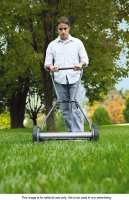Prevent pollution at home

Posted by peter88
from the Home and Garden category at
19 Jul 2011 10:00:14 pm.

Emissions from lawn mowers, chain saws, leaf blowers, and other outdoor power equipment account for a significant amount of pollution. What's more, such emissions might be contributing to the formation of ground-level ozone, which can compromise human health. Natural ozone in the upper atmosphere shields the planet from harmful radiation. But ozone at ground level, which can form when certain outdoor power equipment emits hydrocarbons and nitrogen oxides, can impair lung function, help produce smog and even inhibit plant growth.
Homeowners concerned about the environment might feel as though they're caught in a Catch-22. Protecting the environment is likely important to them but so is taking care of their property. However, it's possible to do both; it just requires taking a few preventative measures when working out in the yard.
* Don't spill the gas. Small gasoline spills can damage the yard, leaving dead spots wherever gas came into contact with the yard. But even the smallest of spills can cause the gas to evaporate and pollute the air. When refilling the gas tank, do so on the driveway and not in the yard to avoid damaging the property. Use a gasoline container that's easy to handle and use a funnel or spout to reduce the likelihood of spillage. Once the tank has been filled, make sure the caps on both the power equipment and the gasoline container have been closed tightly, and store the container out of the sunlight, ideally in a cool, dry place.
* Go manual. Some lawn maintenance requires the use of gas-powered tools to get the job done in a timely fashion. Homeowners with large yards, for instance, will likely need a gas-powered mower to cut their grass in a reasonable amount of time. However, in lieu of gas-powered tools to trim hedges and trees around the yard, use a traditional manual hedge clipper instead. Many of today's manual hand tools are designed to be user-friendly and, as a result, are much lighter and less bulky than the tools of yesteryear. Homeowners with smaller yards might even consider using reel push mowers that don't generate any emissions whatsoever.
* Cut down on cutting. Instead of cutting the grass every weekend, visit the local lawn and garden center and ask if there are any grass and flower seed mixtures that will make the grass grow more slowly. This often depends on the region and the type of grass that thrives in the region, but it can help reduce the number of times the lawn needs to be cut and reduce emissions as a result.
* Plant more trees. Planting more trees around the property can be advantageous for a number of reasons. If the yard has more trees, that means it will have less grass, decreasing the amount of time it takes to mow the yard, and thereby reducing emissions from the mower. Another eco-friendly benefit to planting more trees is that, if planted strategically to provide shade, energy usage, in addition to cooling costs, during the hot summer will decrease. Homeowners who plant native wildflowers and plants also can reduce the time it takes to maintain their yard, as such plants typically require little to no maintenance after planting.
* Don't allow equipment to deteriorate. Just like an automobile, gas-powered maintenance tools work more efficiently when they're well maintained. If filters aren't replaced or machines are allowed to fall into disrepair, they won't operate with much efficiency, meaning they'll burn more gasoline and produce more emissions. In addition to the environmental benefits of maintaining equipment, homeowners can also save money by taking care of their equipment, increasing the tools' life expectancy while improving fuel efficiency.
Tags: prevent pollution
0 Comments



